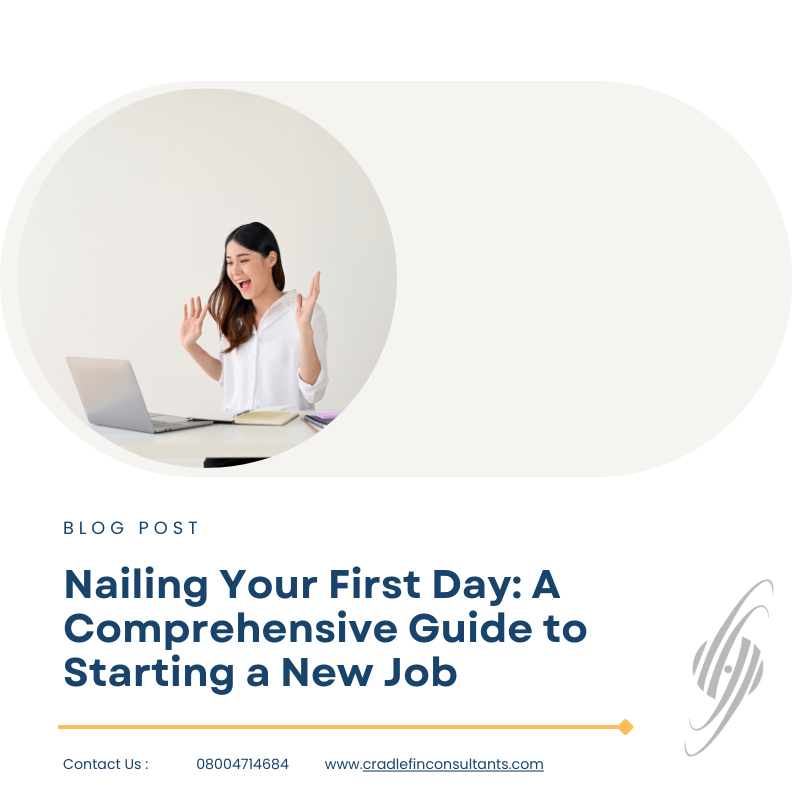Starting a new job often comes with a wave of excitement mixed with nervousness. Did you know that nearly 25% of new hires leave their jobs within the first year? Making a strong first impression on your first day can play a crucial role in shaping your future success at the company. This guide will equip you with essential tips to help you nail your first day, from preparation to building lasting relationships.
Before You Start: Preparation is Key
Planning Your Outfit
Dressing appropriately for your new job is essential. Research the company culture to ensure your attire aligns with expectations. For instance, tech companies may embrace a casual outfit, while finance firms typically require formal business wear. Dress for success by choosing attire that reflects the company’s ethos and makes you feel confident.
Mapping Your Route
Arriving on time sets a positive tone for your first day. Familiarise yourself with the route and cheque for any potential traffic issues. Consider using a navigation app to find alternative routes or to plan for unexpected delays. Aim to arrive at least 10 to 15 minutes early.
Reviewing Key Information
Preparation often makes a difference between feeling nervous and being ready. Go through any onboarding materials, contact lists, and pre-reading assignments. Research shows that about 40% of employees feel unprepared on their first day, so take the time to equip yourself with the necessary knowledge.
First Impressions Matter: Making a Great Start
The Power of Body Language
Nonverbal communication speaks volumes. Confidence is key; maintain good posture, offer a firm handshake, and make eye contact to convey enthusiasm. Studies show that people form impressions within the first seven seconds of meeting someone, so be aware of your body language and facial expressions.
Introductions and Networking
Take the initiative to meet your colleagues. Building rapport fosters a positive work environment. Practise introducing yourself, and remember to ask open-ended questions to encourage conversations. To remember names, try repeating them during the conversation or associating names with a visual cue.
Active Listening and Engagement
Listening attentively during meetings shows your commitment. Demonstrating engagement through nods and appropriate facial expressions enhances connections with your new team. If you have questions, ask them thoughtfully to spark meaningful discussions.
Mastering Your New Role: Understanding Expectations
Clarifying Responsibilities
Understanding your job description is vital for success. Don’t hesitate to ask your manager for clarification on responsibilities to ensure you’re on the same page. A simple “Could you explain what you expect from me in this role?” can open up constructive dialogue.
Setting Expectations
Managing workloads and deadlines starts with understanding what’s expected. Set realistic goals and don’t shy away from requesting guidance. For example, you might say, “I want to make sure I meet your expectations. Can you clarify what you need for this project?”
Learning the Ropes
Never hesitate to ask questions. Curious employees can adapt quickly to company processes and procedures. Enquire about workflows, tools, or resources to help you find your footing sooner.
Building Relationships: Connecting with Your Team
Team Dynamics
Observe how your team interacts. Understanding workplace culture can help you fit in. Be approachable and open; small gestures like a smile or a friendly greeting can go a long way in fostering connections.
Mentorship Opportunities
Consider seeking a mentor within the organisation. A mentor can guide you through the challenges of a new role. Approach someone whose work you admire and express your interest in learning from them.
Networking Within the Organisation
Expand your professional network beyond your immediate team. Attend company events and engage in informal conversations to learn about different departments and their functions.
Beyond the First Day: Setting Yourself Up for Success
Setting Goals and Priorities
Establishing short-term goals helps manage your time effectively. Focus on what needs to be done in the first week, month, and quarter. Break down tasks into smaller, manageable steps for clarity.
Seeking Feedback
Proactively ask for feedback from your manager and colleagues. Constructive criticism can highlight areas for improvement. A simple, “How do you think I can improve?” shows your commitment to growth.
Continuous Learning
Stay informed about industry trends and company updates. Pursue opportunities for professional development to remain relevant and engaged in your role.
Conclusion
Nailing your first day at a new job requires careful preparation, positive interactions, and a commitment to continuous learning. By understanding your responsibilities, building relationships, and setting achievable goals, you’ll lay a solid foundation for your career. Reflect on these strategies and embrace your next opportunity with confidence. Remember, each first day is not just a new beginning but a chance to shine.






